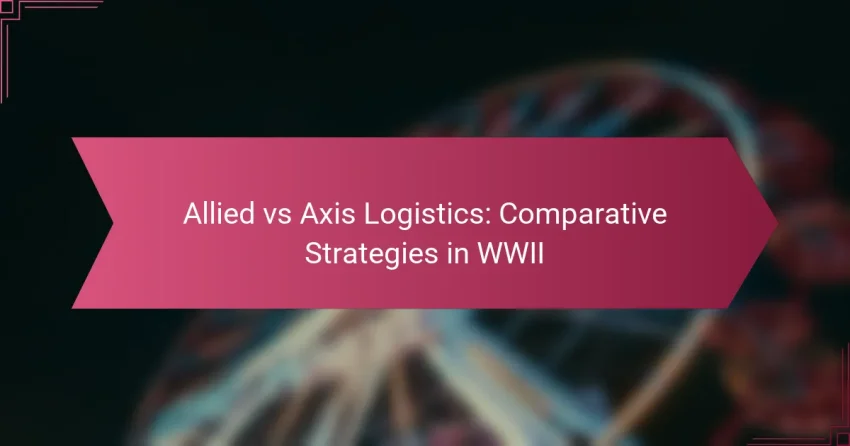Logistics was a decisive factor in the outcomes of major battles during World War II, shaping troop movements and supply chains that directly impacted military effectiveness. From the critical supply failures at Stalingrad to the successful logistical planning of the D-Day invasion, the ability to manage resources efficiently often determined victory or defeat. In the…
Category: WWII Tactics: Logistics and Supply Chain Approaches
Allied vs Axis Logistics: Comparative Strategies in WWII
During World War II, the logistical strategies of the Allied and Axis forces played a crucial role in determining the outcome of the conflict. The Allies excelled in supply chain management and resource allocation, enabling them to maintain effective military operations across diverse theaters. In contrast, the Axis powers faced significant logistical challenges, including overextended…
Transportation: Role in WWII Military Operations
Transportation was vital to military operations during World War II, facilitating the movement of troops, equipment, and supplies over extensive distances. The effectiveness of land vehicles, aircraft, and naval vessels was crucial for maintaining momentum in battles and ensuring that forces received the necessary support and resources across various theaters of war. How Did Transportation…
WWII Logistics: Lessons for Modern Military Operations
World War II logistics played a pivotal role in shaping military operations by highlighting the importance of effective supply chain management, transportation coordination, and strategic planning. The challenges faced during this period, such as supply shortages and difficult terrain, necessitated innovative solutions that continue to inform modern military strategies. By understanding these historical lessons, contemporary…
Resource Allocation: Impact on WWII Campaign Success
Resource allocation was a pivotal factor in the success of World War II campaigns, shaping military strategies and influencing logistics and troop morale. The effective distribution of supplies, personnel, and equipment not only enhanced operational capabilities but also determined the outcomes across various theaters of war. How Did Resource Allocation Affect WWII Campaign Success? Resource…
Supply Chain Management: Evolution During WWII
During World War II, supply chain management underwent a profound transformation to address the complex demands of military logistics. This period saw the introduction of innovative practices such as just-in-time inventory systems and advanced transportation networks, which not only improved efficiency but also set the stage for modern supply chain methodologies in the post-war era….
Supply Lines: Sustainability, Strategy and Impact in WWII Campaigns
Supply lines played a vital role in the success of military operations during World War II, directly impacting logistics, strategy, and campaign effectiveness. The establishment of sustainable supply chains, which utilized local resources and optimized transportation networks, was essential for ensuring that troops received the necessary resources to maintain operational momentum and achieve victory. How…






